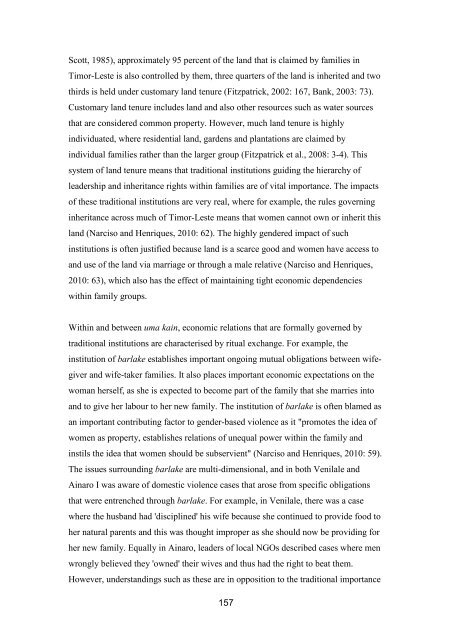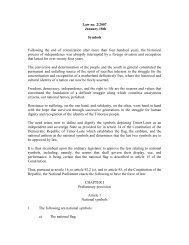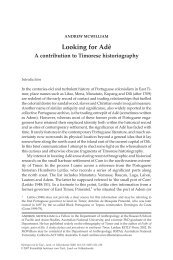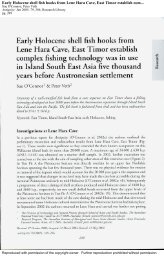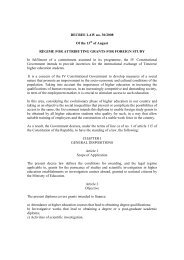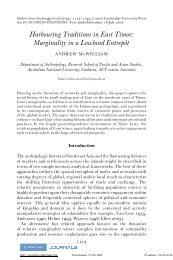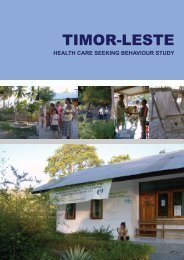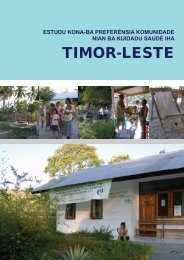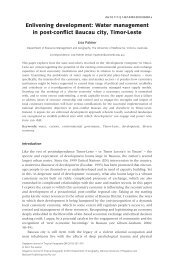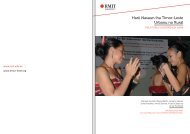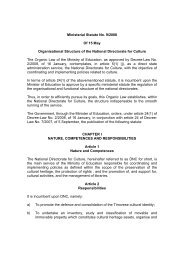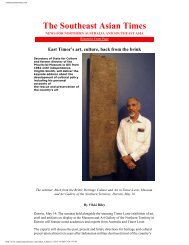Local Governance in Timor-Leste - Secretaria de Estado da Arte e ...
Local Governance in Timor-Leste - Secretaria de Estado da Arte e ...
Local Governance in Timor-Leste - Secretaria de Estado da Arte e ...
- No tags were found...
You also want an ePaper? Increase the reach of your titles
YUMPU automatically turns print PDFs into web optimized ePapers that Google loves.
Scott, 1985), approximately 95 percent of the land that is claimed by families <strong>in</strong><strong>Timor</strong>-<strong>Leste</strong> is also controlled by them, three quarters of the land is <strong>in</strong>herited and twothirds is held un<strong>de</strong>r customary land tenure (Fitzpatrick, 2002: 167, Bank, 2003: 73).Customary land tenure <strong>in</strong>clu<strong>de</strong>s land and also other resources such as water sourcesthat are consi<strong>de</strong>red common property. However, much land tenure is highly<strong>in</strong>dividuated, where resi<strong>de</strong>ntial land, gar<strong>de</strong>ns and plantations are claimed by<strong>in</strong>dividual families rather than the larger group (Fitzpatrick et al., 2008: 3-4). Thissystem of land tenure means that traditional <strong>in</strong>stitutions guid<strong>in</strong>g the hierarchy oflea<strong>de</strong>rship and <strong>in</strong>heritance rights with<strong>in</strong> families are of vital importance. The impactsof these traditional <strong>in</strong>stitutions are very real, where for example, the rules govern<strong>in</strong>g<strong>in</strong>heritance across much of <strong>Timor</strong>-<strong>Leste</strong> means that women cannot own or <strong>in</strong>herit thisland (Narciso and Henriques, 2010: 62). The highly gen<strong>de</strong>red impact of such<strong>in</strong>stitutions is often justified because land is a scarce good and women have access toand use of the land via marriage or through a male relative (Narciso and Henriques,2010: 63), which also has the effect of ma<strong>in</strong>ta<strong>in</strong><strong>in</strong>g tight economic <strong>de</strong>pen<strong>de</strong>ncieswith<strong>in</strong> family groups.With<strong>in</strong> and between uma ka<strong>in</strong>, economic relations that are formally governed bytraditional <strong>in</strong>stitutions are characterised by ritual exchange. For example, the<strong>in</strong>stitution of barlake establishes important ongo<strong>in</strong>g mutual obligations between wifegiverand wife-taker families. It also places important economic expectations on thewoman herself, as she is expected to become part of the family that she marries <strong>in</strong>toand to give her labour to her new family. The <strong>in</strong>stitution of barlake is often blamed asan important contribut<strong>in</strong>g factor to gen<strong>de</strong>r-based violence as it "promotes the i<strong>de</strong>a ofwomen as property, establishes relations of unequal power with<strong>in</strong> the family and<strong>in</strong>stils the i<strong>de</strong>a that women should be subservient" (Narciso and Henriques, 2010: 59).The issues surround<strong>in</strong>g barlake are multi-dimensional, and <strong>in</strong> both Venilale andA<strong>in</strong>aro I was aware of domestic violence cases that arose from specific obligationsthat were entrenched through barlake. For example, <strong>in</strong> Venilale, there was a casewhere the husband had 'discipl<strong>in</strong>ed' his wife because she cont<strong>in</strong>ued to provi<strong>de</strong> food toher natural parents and this was thought improper as she should now be provid<strong>in</strong>g forher new family. Equally <strong>in</strong> A<strong>in</strong>aro, lea<strong>de</strong>rs of local NGOs <strong>de</strong>scribed cases where menwrongly believed they 'owned' their wives and thus had the right to beat them.However, un<strong>de</strong>rstand<strong>in</strong>gs such as these are <strong>in</strong> opposition to the traditional importance157


